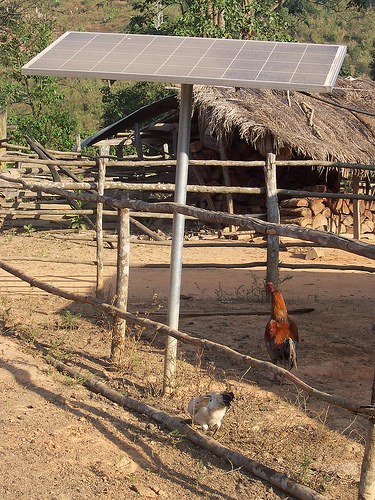I just can’t get enough of renewable energy helping developing nations. I feel it may be the most humane, economical, and just plain interesting way to use renewable energy technology. Indonesia thinks so as well.
They plan on having 2000 villages powered by a combination of hydro, solar, and biofuel by 2009. Currently the country has 140 villages that can meet their own energy needs, so going to 2000 in just a couple of years seems to be a big challenge. But Honestly if each village gets a good sized solar array, combined with their low energy needs, 2000 is an achievable goal. Solar power does not require that you install large infrastructure, no huge supply lines for the fuel, no large scale distribution networks are needed. You put the panels on the roof, and you are ready to go.
The micro-hydro, biofuel and solar projects will also create new jobs for installers and maintenance people. Potentially enhancing the local economy by keeping the money that would have gone to a large outside company in the village.
Yusgiantoro said the villages were eventually expected to produce an energy surplus which they could then sell.
The scheme was hoped to reduce the number of unemployed by one million by 2009, the minister said, adding that 45 percent of Indonesia’s 70,000 villages were underdeveloped.
Around a third of Indonesians have no access to electricity, the World Bank says.
One pioneer village, Tanjung Harjo in Central Java, was already using vegetable energy resources to meet all its needs and was selling its surplus power to a nearby sugar factory, the agency said. (via)
These power stations are going to be rather cheap by American standards.
The government will build 15,000 household solar power units, each with a capacity of 100 watts, the Ministry of Energy and Mineral Resources’ Director General of Electricity and Energy Yogo Pratomo was quoted Tuesday by The Jakarta Post as saying.
“We hope the (small-scale) power units will meet electricity demand in remote areas in eastern Indonesia,” he said.
Each of the solar cell units will cost between 5 million rupiah (500 US dollars) and 6 million rupiah in construction.
“However, they won’t use any fuel except sunlight so there is no extra expense,” said Yogo.
Aside from utilizing sunlight, the government also plans to build 200 micro-hydro power plants with a capacity of between 50 kilowatts (kW) and 500 kW each. Investment needed for every kW is estimated at 20 million rupiah (2,000 dollars). (via)
With economy of scale type forces there is no reason that small villages and town in America could not start becoming energy self-sufficient one at a time. The communities could pool resources and install medium scale wind farms and solar arrays for the town. Everyone pays in and then everyone gets cheap electricity.

Photovoltaic is still expensive – though it can make sense in remote communities. Hopefully it will come down in price – there are ways of focusing the light onto a small area of cells, to reduce cost, but I suspect that may be less reliable (esp if the lens or mirror has to move.
I’ve also heard that patents have recently expired on older types of cells, making for cheaper options… (http://www.homerdixon.com/forum/read.php?f=1&i=369&t=369 ) . I can’t confirm that though.
Chris
The thin-film processes seem to show much improvement lately. I believe they use amorphous silicon instead of crystalline which loser the cost a lot (efficiency too, but it seems the price drop is greater than the efficiency loss).
i personally see the projects as a waste of money. govt actually has to learn from their past experiences that many SHSs in villages are just left unmanaged and finally are broken. pouring thousands of SHSs to villages that are new to the technology is a true waste of money. once villagers get in touch with electricity, their demand is becoming higher and SHS will not be able to meet the demand. some might try to bypass the controller and the system will be broken and villages will eventually back to darkness…what a stupid decision